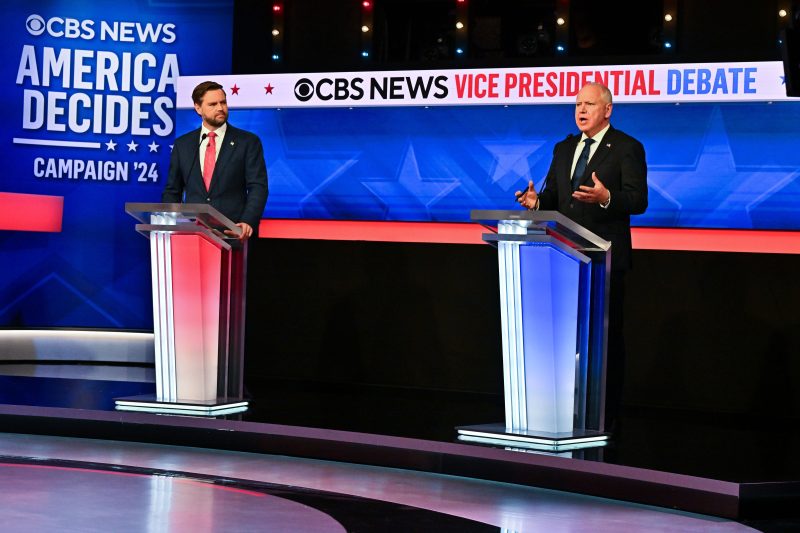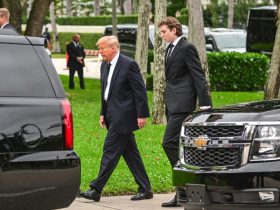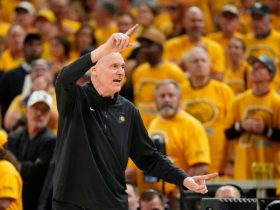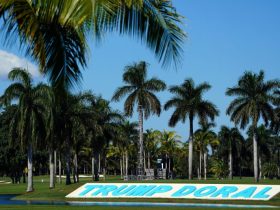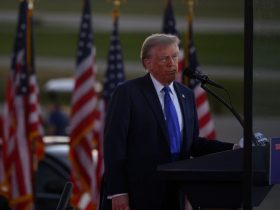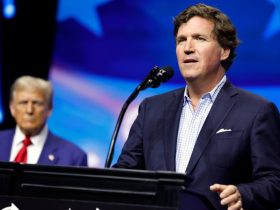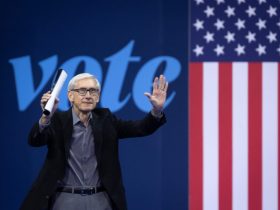Minnesota Gov. Tim Walz (D) and Ohio Sen. JD Vance (R) met on the debate stage Tuesday night in what is likely to be the only vice-presidential debate of the 2024 election cycle. Throughout the event, the two candidates sought to depict their opponents’ stances as at odds with their running mates, while sparring with civility over immigration, abortion, the economy, and more.
1. “If you don’t know Amanda or a Hadley, you soon will.”
On the issue of abortion, Walz emphasized that former president Donald Trump appointed three Supreme Court justices who helped overturn Roe v. Wade.
“Trump put this all into motion. He brags about how great it was that he put the judges in and overturned Roe,” Walz said. “ … And then he tells us: ‘Oh, we send it to the states. It’s a beautiful thing.’ Amanda Zurawski would disagree with you.”
Zurawski is a Texan woman who could not have an abortion despite her fetus having no chance of surviving, and was only allowed to deliver after she became septic, leaving her with permanent physical damage.
Walz then spoke about Hadley Duvall, a Kentucky woman who, at age 12, was raped and impregnated by her stepfather. Duvall — who has appeared in several Democratic campaign ads — has been an outspoken supporter of abortion rights, saying that women and girls should not be forced to carry their rapist’s child.
Walz said that, as governor, he helped reinstate abortion rights in Minnesota after Roe fell.
Then, he delivered a warning: “If you don’t know Amanda or a Hadley, you soon will.” Conservatives are, he said, “going to make it more difficult” for Americans to access reproductive care.
2. “We’ve got to do so much better of a job at earning the American people’s trust back on this issue.”
Vance tried a new tack when it came to abortion and argued that Republicans need to earn Americans’ trust on the issue of abortion — a message Republican strategists have urged their candidates to embrace in this election after the overturning of Roe in 2022 negatively impacted the party’s results in that year’s midterm elections.
Both Trump and Vance have struggled to address abortion issues on the campaign trail as they attempt to please a conservative base that supports restrictions on abortions while trying to appeal to a majority of Americans who support abortion rights. Since being named Trump’s running mate, Vance has moderated his position on abortion, yet his past support for sweeping abortion restrictions has haunted him on the trail. Democrats have repeatedly emphasized that Vance, as recently as 2022, said that he wanted abortion “to be illegal nationally.”
On the debate stage Tuesday, Vance sought to soften this stance by saying that a woman “very dear” to him once revealed to him that if she hadn’t had an abortion, her life would’ve been “destroyed.”
“What I take from that, as a Republican who proudly wants to protect innocent life in this country, who proudly wants to protect the vulnerable, is that my party, we’ve got to do so much better of a job at earning the American people’s trust back on this issue,” Vance said.
The GOP vice-presidential nominee, however, did not voice support for a national bill to protect abortion rights but rather doubled down on Trump’s position to leave the choice up to the states, arguing that “we have a big country and it’s diverse, and California has a different viewpoint on this than Georgia.” Republicans, he said, should “be pro-family” and “make it easier for moms to afford to have babies.”
3. “We have to make the doors lock better. We have to make the doors stronger. We’ve got to make the windows stronger.”
On the topic of mass shootings, Vance echoed his previous comments on the trail, and said that gun-control policies would not resolve the issue of gun violence and school shootings. Instead, he argued that the government needs to invest in making schools safer by increasing security and fortifying buildings.
“We have to make the doors lock better. We have to make the doors stronger. We’ve got to make the windows stronger,” Vance said. “And of course, we’ve got to increase school resource officers, because the idea that we can magically wave a wand and take guns out of the hands of bad guys, it just doesn’t fit with recent experience.”
Vance has opposed a majority of gun legislation that Democrats claim could curb gun violence, such as universal background checks and legislation to ban certain semiautomatic rifles, including AR-15s.
Last month, during a rally in Phoenix held in the wake of the Apalachee High School killings in Georgia, Vance said school shootings are a “fact of life” that he dislikes, but he argued that stricter gun-control laws are not the answer to the country’s mass shooting crisis. He also argued then that the government has to invest more in school security.
On the debate stage Tuesday, Walz responded to Vance’s proposal of beefing up schools’ security by saying: “No one’s trying to scaremonger and say, we’re taking your guns, but I ask all of you out there, do you want your schools hardened to look like a fort?”
4. “Just because you have a mental health issue doesn’t mean you’re violent.”
Also on the issue of guns, Vance suggested that mental health issues are “a big” reason the United States has such high rates of gun violence and mass shootings.
“We unfortunately have a mental health crisis in this country that I really do think that we need to get to the root causes of,” Vance said. “I don’t think it’s the whole reason why we have such a bad gun violence problem, but I do think it’s a big piece of it.”
Walz, however, countered that he was wary of pinning the United States’ mass shooting crisis on a mental health crisis.
“This idea of stigmatizing mental health — just because you have a mental health issue doesn’t mean you’re violent,” Walz said. “What we end up doing is, we start looking for a scapegoat. Sometimes it just is the guns, it’s just the guns. And there are things that you can do about it.”
5. “That is a damning non-answer.”
In perhaps the most tense moment of the debate, Walz asked Vance whether he believes Trump lost the 2020 election.
Vance did not answer the question, and instead sidestepped with a non sequitur: “Tim, I’m focused on the future. Did Kamala Harris censor Americans from speaking their mind in the wake of the 2020 covid situation?”
To that, Walz replied: “That is a damning non-answer.”
The exchange followed a tense back-and-forth on Trump’s efforts to overturn the results of the 2020 election, and on the deadly Jan. 6, 2021, attack on the U.S. Capitol by a mob of Trump supporters. Vance complained that Democrats have sought to portray him and Trump as threats to American democracy, falsely arguing that Trump “peacefully gave over power” at the end of his term. (Federal prosecutors charged Trump with conspiring to overturn the results of the 2020 election, among other crimes, including spreading claims about voter fraud that he knew to be false, and pressuring local, state and federal officials to block Joe Biden’s victory.)
Vance then claimed that Hillary Clinton, the 2016 Democratic presidential candidate, accused Trump of tampering with that election by asking Russia to buy Facebook ads. The Ohio senator appeared to be equating that to the violent Jan. 6 attack.
Walz said that was a false equivalency.
“January 6 was not Facebook ads,” Walz said, accusing Vance of participating in “revisionist history.” The insurrection on the Capitol, Walz said, happened, and it presented a “threat to our democracy in a way that we had not seen,” sparked by Trump’s inability to acknowledge that he lost the 2020 election.
Walz then said he and Harris will accept the results of this election: “When this is over, we need to shake hands this election, and the winner needs to be the winner.”
6. “I got there that summer and misspoke on this.”
When pressed by moderators to explain his claim that he was in Hong Kong during the Tiananmen Square protests, Walz said he “misspoke” when he said he had visited Hong Kong on June 4, 1989, the day of the Tiananmen Square massacre.
On Tuesday, CNN reported that Walz claimed in a June 2019 radio interview to have been in the city when the massacre unfolded. CNN also cited Walz saying during a 2014 House hearing that he “was in Hong Kong in May 1989” and that, “as the events were unfolding, several of us went in. And I still remember the train station in Hong Kong.”
CNN’s report followed coverage by the conservative news outlet Washington Free Beacon, which found old newspaper reports that placed Walz in Nebraska at around the time of the protests. Per CNN, a Nebraska newspaper article published in April 1989 said Walz planned on traveling to China in early August of that year.
On the debate stage Tuesday, Walz said he “got there that summer and misspoke on this.”
Still, he insisted that he had been in Hong Kong and China “during the democracy protests.”
“And from that I learned a lot of what needed to be in governance,” he said.
“I’ve tried to do the best I can, but I’ve not been perfect,” he added. “And I’m a knucklehead at times, but it’s always been about that.”

